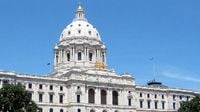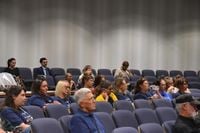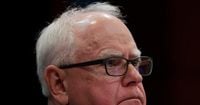In the wake of the devastating Annunciation Church shooting on August 27, 2025, Minnesota's political landscape has been gripped by fierce debate and mounting public pressure over gun control measures. Governor Tim Walz, a Democrat, has found himself at the center of these discussions, calling for urgent legislative action to address gun violence and school safety, even as partisan gridlock threatens to stall progress.
According to a recent KSTP/SurveyUSA poll, a clear majority of Minnesotans—58% of 675 registered voters surveyed across the state—support convening a special legislative session to tackle gun violence and improve school safety. Only 28% oppose such a session, while 14% remain undecided. This groundswell of support, however, masks deep political and regional divisions that continue to complicate the path forward.
Breaking down the numbers, the poll reveals that 86% of Democrats are in favor of a special session, compared to just 43% of Republicans and 46% of independents. Urban voters and those who say they are certain to vote are the most enthusiastic backers of a ban on assault weapons, noted Carleton College political analyst Steven Schier in comments to KSTP. "So this is very much an important base issue for the governor," Schier added, highlighting the political stakes for Walz and his party.
Support for an assault-style gun ban also varies considerably by region. While 61% of Twin Cities respondents favor such a ban, support drops to 40% in southern Minnesota, 44% in the west, and 45% in the northeast. Overall, 53% of those polled back a ban on assault-style guns, with 35% opposed and 12% unsure. These numbers could shift significantly depending on the specific language of any proposed legislation, analysts caution.
Yet, despite this apparent mandate for action, the governor and legislative leaders remain locked in a stalemate. As of September 23, 2025, Walz is still in talks with lawmakers about a possible special session, but no agreement on the agenda has been reached. The governor has made his demands clear: "My only thing is I asked for a floor vote on high-capacity magazines and assault weapons and just let the members vote on it," Walz told reporters on Tuesday, as reported by KSTP.
Frustration is mounting on all sides. Walz has publicly criticized Republican legislators for refusing to hold votes on gun bans, including an assault weapons ban. "I guess there is a line in the sand. I was told by Republican leadership that there would never be a vote on guns, there wouldn’t be a vote on gun bans. And that’s not acceptable in reaching compromise," Walz said, according to ABC 6 News and FOX 9. He added, "It's clear to me that Republican legislators want to talk about everything else except guns."
Republican leaders, for their part, push back against this narrative. GOP House Speaker Lisa Demuth disputed Walz's characterization, arguing that the governor "is either misunderstanding or mischaracterizing the fact that even DFL leaders have acknowledged there are not enough votes to pass a gun ban." In a statement, Demuth said, "I did not say there would never be a vote – but you need a bill in order to vote, and the Governor has given no language or detail of what he wants voted on aside from vague bans. If he is serious about wanting a vote, he should be honest about what he's actually looking for a vote on instead of playing politics to further his campaign."
The impasse is not just between parties. Even within the Democratic-Farmer-Labor (DFL) caucus, there are doubts about whether enough votes exist to pass a ban on assault weapons and high-capacity magazines—measures that DFL leaders have made their highest priority. This uncertainty was on full display last week, when the Senate Gun Violence Prevention Working Group, consisting of six Democrats and five Republicans, met for more than six hours over two sessions. Despite extensive discussions, the group failed to reach consensus on how to respond legislatively to the Annunciation shooting, as reported by KSTP and other outlets.
Meanwhile, the urgency of the issue is underscored by the poll's finding that 40% of Minnesotans view mental health as the most important issue for a special session to address, followed by guns at 30%, more school security at 17%, and criminal penalties at 10%. This suggests that while gun control is a flashpoint, many voters see the problem as multifaceted and expect lawmakers to consider a range of solutions.
Governor Walz has not shied away from making his position clear. At a press conference outside a Minnesota elementary school on September 2, he announced plans to call the legislature for an emergency gun control session. "The thing that makes America unique in terms of shootings is we just have more guns and the wrong types of guns are on the streets," Walz said, as quoted by FOX 9. He has also expressed hope that Republican legislators will reconsider their stance after being contacted by families affected by the Annunciation Catholic school shooting, which left the community reeling.
Some lawmakers have responded with proposals of their own. State Senator Zaynab Mohamed (DFL) has been pushing for a ban on .50 caliber firearms in the wake of the tragedy, even though that type of weapon was not used in the attack. Her efforts reflect a broader push among some Democrats to expand the scope of gun restrictions, though such proposals have also drawn criticism from gun rights advocates and some members of the public.
Political analyst Steven Schier emphasized the importance of reaching a pre-agreement before calling a special session. "If you start a special session without an agreed-upon agenda, it can sprawl," Schier warned in comments to KSTP. "It can produce nasty fights. It may not produce the outcomes the governor wants and engage the governor in a lot of nasty, partisan finger-pointing."
As the debate drags on, the families affected by the Annunciation shooting—and Minnesotans across the state—are left waiting for concrete action. The stakes are high, and the path forward remains uncertain. For now, the question is whether Minnesota's leaders can bridge their differences and respond to the public's call for change, or whether political gridlock will continue to stand in the way.
With passions running high and the community still grieving, the coming weeks will test both the resolve and the political skill of those at the helm of Minnesota's government.



